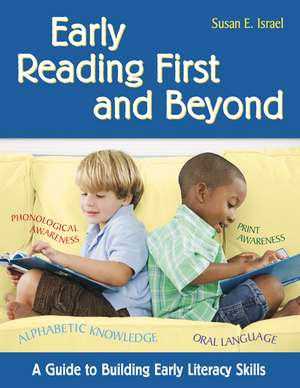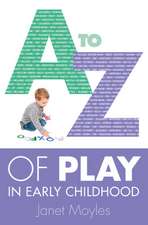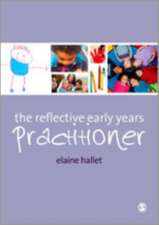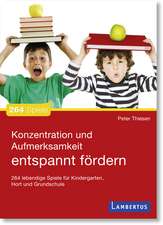Early Reading First and Beyond: A Guide to Building Early Literacy Skills
Editat de Susan E. Israelen Limba Engleză Paperback – 11 feb 2008
- Partnering with parents
- Designing preschool educational programs of excellence
- Oral language development
- Phonological awareness
- Print awareness
- Alphabetic knowledge
- Developing early metacognitive thinking
Preț: 226.60 lei
Nou
Puncte Express: 340
Preț estimativ în valută:
43.36€ • 44.80$ • 36.07£
43.36€ • 44.80$ • 36.07£
Carte tipărită la comandă
Livrare economică 19 martie-02 aprilie
Preluare comenzi: 021 569.72.76
Specificații
ISBN-13: 9781412951029
ISBN-10: 141295102X
Pagini: 120
Dimensiuni: 216 x 279 x 8 mm
Greutate: 0.34 kg
Ediția:1
Editura: SAGE Publications
Colecția Corwin
Locul publicării:Thousand Oaks, United States
ISBN-10: 141295102X
Pagini: 120
Dimensiuni: 216 x 279 x 8 mm
Greutate: 0.34 kg
Ediția:1
Editura: SAGE Publications
Colecția Corwin
Locul publicării:Thousand Oaks, United States
Cuprins
Preface
Acknowledgments
About the Author
1. Introduction to Early Reading First
Research That Early Childhood Teachers Can Use About Early Reading First
Summary
2. Oral Language Development: Emerging Vocabulary, Expressive Language, and Listening Comprehension
Why Teach Oral Language to Preschool-age Children?
Research That Early Childhood Teachers Need to Know About Oral Language Development
New Research-Based Practices Early Childhood Teachers Can Use
Early Reading First Assessment Tools for Oral Language Development
Differentiating for Early Learners With Individual Needs
Teaching Tips That Increase Home-School Connections
Literacy Treasure Chest
Summary
3. Alphabetic Knowledge
Research That Early Childhood Teachers Need to Know About Alphabetic Knowledge
New Research-Based Practices That Early Childhood Teachers Can Use
Early Reading First Assessment Tools for Knowledge of Alphabetic Principle
Differentiating for Early Learners with Individual Needs
Literacy Treasure Chest
Summary
4. Phonological Awareness: Giving Early Learners an Advantage When Learning to Read, by Kathryn Bauserman
Research That Early Childhood Teachers Need to Know About Phonological Awareness
New Research-Based Practices That Early Childhood Teachers Can Use
Early Reading First Assessment Tools for Phonemic Awareness
Differentiating for Early Learners With Individual Needs
Teaching Tips That Increase Home-School Connections
Literacy Treasure Chest
Summary
5. Print Awareness, by Cynthia A. Lassonde
Research That Early Childhood Teachers Need to Know About Print Awareness
New Research-Based Practices That Early Childhood Teachers Can Use
Early Reading First Assessment Tools for Print Awareness
Differentiating for Learners With Individual Needs
Teaching Tips That Increase Home-School Connections
Literacy Treasure Chest
6. Designing Early Literacy Classrooms of Excellence
Research That Early Childhood Teachers Need to Know About Creating Early Childhood Centers of Excellence
Research That Early Childhood Teachers Can Use to Create Centers of Excellence
How to Get Started With Designing Early Literacy Enviroments of Excellence
Resources to Get You Started
Parent Tips on Developing Phonemic Awareness at Home
Tips on Small Group Dialogue in Early Childhood Classrooms
Teaching Tips for Parents as Helping Hands
Literacy Treasure Chest
Summary
Resources
A Facilitator's Guide to Planning and Organizing for an Engaging and Motivating Professional Development Day
Sample Early Childhood Literacy Needs Assessment
References
Index
Acknowledgments
About the Author
1. Introduction to Early Reading First
Research That Early Childhood Teachers Can Use About Early Reading First
Summary
2. Oral Language Development: Emerging Vocabulary, Expressive Language, and Listening Comprehension
Why Teach Oral Language to Preschool-age Children?
Research That Early Childhood Teachers Need to Know About Oral Language Development
New Research-Based Practices Early Childhood Teachers Can Use
Early Reading First Assessment Tools for Oral Language Development
Differentiating for Early Learners With Individual Needs
Teaching Tips That Increase Home-School Connections
Literacy Treasure Chest
Summary
3. Alphabetic Knowledge
Research That Early Childhood Teachers Need to Know About Alphabetic Knowledge
New Research-Based Practices That Early Childhood Teachers Can Use
Early Reading First Assessment Tools for Knowledge of Alphabetic Principle
Differentiating for Early Learners with Individual Needs
Literacy Treasure Chest
Summary
4. Phonological Awareness: Giving Early Learners an Advantage When Learning to Read, by Kathryn Bauserman
Research That Early Childhood Teachers Need to Know About Phonological Awareness
New Research-Based Practices That Early Childhood Teachers Can Use
Early Reading First Assessment Tools for Phonemic Awareness
Differentiating for Early Learners With Individual Needs
Teaching Tips That Increase Home-School Connections
Literacy Treasure Chest
Summary
5. Print Awareness, by Cynthia A. Lassonde
Research That Early Childhood Teachers Need to Know About Print Awareness
New Research-Based Practices That Early Childhood Teachers Can Use
Early Reading First Assessment Tools for Print Awareness
Differentiating for Learners With Individual Needs
Teaching Tips That Increase Home-School Connections
Literacy Treasure Chest
6. Designing Early Literacy Classrooms of Excellence
Research That Early Childhood Teachers Need to Know About Creating Early Childhood Centers of Excellence
Research That Early Childhood Teachers Can Use to Create Centers of Excellence
How to Get Started With Designing Early Literacy Enviroments of Excellence
Resources to Get You Started
Parent Tips on Developing Phonemic Awareness at Home
Tips on Small Group Dialogue in Early Childhood Classrooms
Teaching Tips for Parents as Helping Hands
Literacy Treasure Chest
Summary
Resources
A Facilitator's Guide to Planning and Organizing for an Engaging and Motivating Professional Development Day
Sample Early Childhood Literacy Needs Assessment
References
Index
Descriere
This reader-friendly resource examines the key elements of Early Reading First to help teachers foster the language, cognitive, and early reading skills critical to young children's success in kindergarten.










